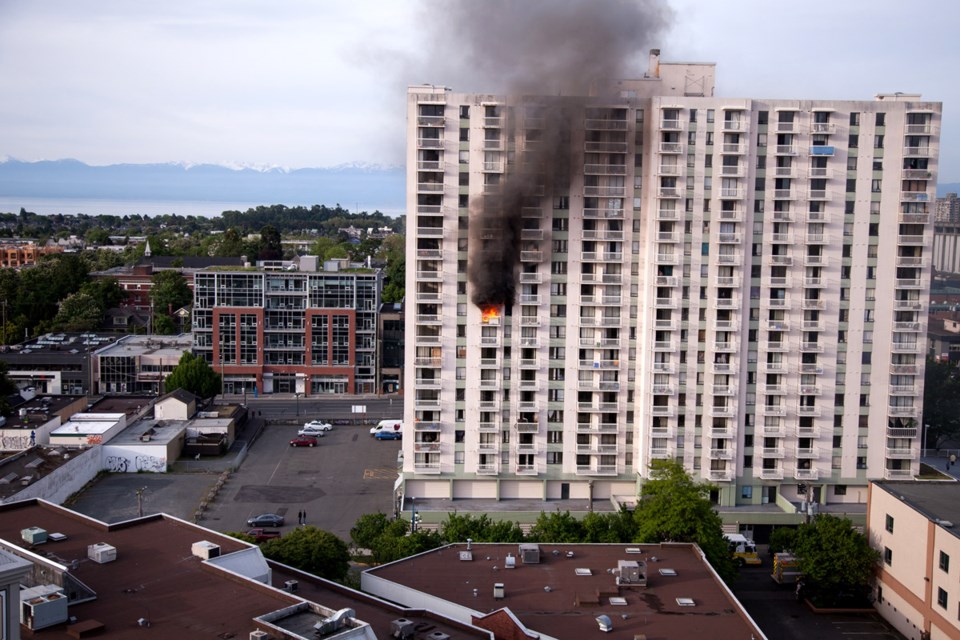The B.C. landlord-tenant authority will take another look at its decision not to investigate the landlord of View Towers, where 70 tenants were displaced following a fire on May 15 last year.
The Residential Tenancy Branch had turned down Together Against Poverty’s request to probe what the advocacy group says are widespread contraventions of legislation by apartment building owner Westsea Construction Ltd.
The tenancy branch’s Nov. 17 decision had suggested that because the landlord allowed, after a dispute-resolution hearing, two tenants to retrieve their belongings nearly three months after the fire, other tenants could apply for hearings to address their claims.
That decision prompted Together Against Poverty (TAPS) to apply to the Supreme Court of B.C. on Jan. 15 for a review, saying the tenancy branch made errors in interpreting the legislation.
“I’m surprised it took filing an application the Supreme Court to get the request taken seriously,” said Stephen Portman, TAPS interim executive director. “If we hadn’t filed an application to the Supreme Court, there is no way this would be going forward.”
Portman also said that the branch failed to take into account the power imbalance between impoverished tenants in a crisis situation and a large landlord. TAPS will be allowed to provide more evidence as to the need for an investigation before the re-evaluation is done, likely within two months, Portman said.
The decision not to investigate Westsea noted that the branch will consider fines only when all other avenues have been exhausted and not as an alternative to dispute resolution.
But, Portman said, the Residential Tenancy Act specifies that investigations can be undertaken to ensure compliance regardless of whether an individual has applied for dispute resolution.
Treating investigation and fines only as a last resort is “clearly not true under the legislation,” said lawyer Sarah Khan, of the B.C. Public Interest Advocacy Centre, who handled the Supreme Court review request.
“It’s too bad we had to go through all the trouble to put together the judicial review application in order to get the [tenancy branch] to consider the proper factors when deciding whether or not to investigate.”
A “timely investigation” would have occurred last May, Portman said, after the branch heard reports that View Towers occupants were given misinformation about the condition of their suites by the landlord and coerced into signing mutual agreements to end their tenancies.
The landlord maintained many suites were contaminated due to the fire — a determination that in Ontario must be made by public health or fire officials in order to deter “reno-victions” of tenants paying low rent.
Westsea did not respond to a request for comment.
B.C. Housing did not comment on why the branch decided to re-evaluate its decision but noted that displaced tenants still have the opportunity to resolve matters through individual applications for dispute resolution.
Many of the 70 tenants displaced from View Towers are low-income, marginalized people, including First Nations, seniors, and people with mental and physical disabilities. “We’re talking about people with mental-health challenges, addiction challenges, low literacy, people who don’t trust bureaucratic institutions,” Portman said.
“It’s a good sign that they’re going to look at it again,” said former tenant Herb Volker.
Volker, whose monthly rent at View Towers was $535, now pays $625 a month for a smaller apartment.
A report published in 2013 found that, in reviewing 78 tenancy branch decisions, the courts recommended a majority of the decisions be set aside due to errors.
Prepared by tenancy law experts at B.C.’s Community Legal Assistance Society, the On Shaky Ground report found the errors included decisions that did not address elements set out by law — “the core of what the arbitrator is assigned to decide.”
The branch has undertaken only one investigation in B.C. that led to a fine — in that case the fee of $155,000 against a Surrey landlord was waived when he did the necessary repairs.



